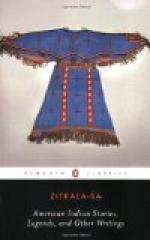Just as the dance was finished, an elderly man, with short, thick hair loose about his square shoulders, rode into their presence from the rear, and leaped lightly from his pony’s back. Dropping the rawhide rein to the ground, he tossed himself lazily on the grass. “Hunhe, you have returned soon,” said the warrior, while extending a hand to his little daughter.
Quickly the child ran to her father’s side and cuddled close to him, while he tenderly placed a strong arm about her. Both father and child, eyeing the figure on the grass, waited to hear the man’s report.
“It is true,” began the man, with a stranger’s accent. “This is the night of the dance.”
“Hunha!” muttered the warrior with some surprise.
Propping himself upon his elbows, the man raised his face. His features were of the Southern type. From an enemy’s camp he was taken captive long years ago by Tusee’s father. But the unusual qualities of the slave had won the Sioux warrior’s heart, and for the last three winters the man had had his freedom. He was made real man again. His hair was allowed to grow. However, he himself had chosen to stay in the warrior’s family.
“Hunha!” again ejaculated the warrior father. Then turning to his little daughter, he asked, “Tusee, do you hear that?”
“Yes, father, and I am going to dance tonight!”
With these words she bounded out of his arm and frolicked about in glee. Hereupon the proud mother’s voice rang out in a chiding laugh.
“My child, in honor of your first dance your father must give a generous gift. His ponies are wild, and roam beyond the great hill. Pray, what has he fit to offer?” she questioned, the pair of puzzled eyes fixed upon her.
“A pony from the herd, mother, a fleet-footed pony from the herd!” Tusee shouted with sudden inspiration.
Pointing a small forefinger toward the man lying on the grass, she cried, “Uncle, you will go after the pony tomorrow!” And pleased with her solution of the problem, she skipped wildly about. Her childish faith in her elders was not conditioned by a knowledge of human limitations, but thought all things possible to grown-ups.
“Haehob!” exclaimed the mother, with a rising inflection, implying by the expletive that her child’s buoyant spirit be not weighted with a denial.
Quickly to the hard request the man replied, “How! I go if Tusee tells me so!”
This delighted the little one, whose black eyes brimmed over with light. Standing in front of the strong man, she clapped her small, brown hands with joy.
“That makes me glad! My heart is good! Go, uncle, and bring a handsome pony!” she cried. In an instant she would have frisked away, but an impulse held her tilting where she stood. In the man’s own tongue, for he had taught her many words and phrases, she exploded, “Thank you, good uncle, thank you!” then tore away from sheer excess of glee.




